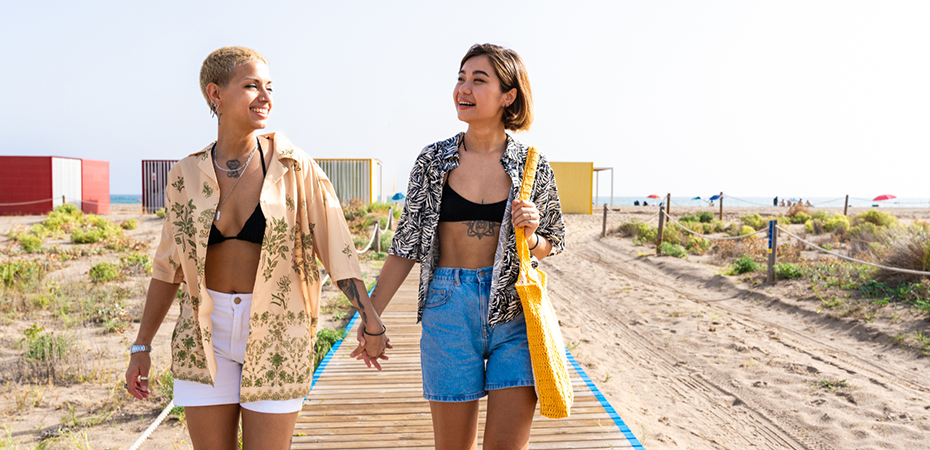In Ontario and globally, Pride festivals have come to signify social progress. Considering there has been a “sharp rise in political hostility” towards 2SLGBTQIA+ (Two-Spirit, lesbian, gay, bisexual, transgender, queer, intersex and asexual) people and an increase in hate crime reports, the movement for gender equity and sexual diversity is more important than ever.
Pride is an iconic event with a long history of urban 2SLGBTQIA+ representations, and cities are usually viewed as centers of gender and sexually diverse communities, which gives the impression that 2SLGBTQIA+ people in outdoor programming and nature are few and far between. But is this the case?
Nature doesn’t discriminate and judge. Yet not all outdoor programs feel welcoming to 2SLGBTQIA+ people. This is why explicit community guidelines that are 2SLGBTQIA+ positive, and groups that organize at the crossroad of nature and identity, are vital to climate justice and making outdoor spaces feel inclusive to everyone.
© Canva
Safety: You Are Welcome Here
Attending outdoor programming with strangers can be risky depending on various factors. For some, there can be an assumption that nature groups are safe, but safety is tenuous and circumstantial. For example, ‘coming out’ to strangers can be met with rejection and violence, and being visibly different, either in your gender presentation and/or expression of sexuality can make a person be the target of bullying. That’s why programs and groups that are grounded in diversity, equity, inclusion and accessibility principles are key in taking the weight of the unknown off the shoulders of individuals.
And when individuals know there are shared values between an organization and its members, it allows them to thrive, as themselves, within these spaces through stronger and more frequent participation.
Inclusion: Radical Space Facilitation
Multidisciplinary artist and community organizer Norma Ibarra writes: “…women, BIPOC [Black, Indigenous and People of Colour] and queer communities forge bonds and establish clubs, organizations and events dedicated to amplifying their voices, coming together to create inclusive, safe spaces where they can showcase their skills and their perspectives, which are too often overlooked. Through their collective efforts, they challenge existing narratives, celebrate the diverse array of talent within their communities, and affirm the importance of visibility and solidarity in the face of marginalization and erasure”.
As Ibarra references, visibility and solidarity are grounded in intersectionality, a term that represents the relationship between – or the intersection of – different identities. This is an important aspect of fostering inclusivity because people might experience multiple identities at the same time.
Outdoor programs and/or groups that are 2SLGBTQIA+ positive, as well as intersectional in their marketing and facilitation, are pioneers in creating activities that are for the whole community. They also diminish the challenges that the 2SLGBTQIA+ community faces, such as hostility, isolation, illness and financial barriers.
© Canva
Advocacy: The Outdoors is for Everyone
In recent years, there has been a refreshing increase in conservation groups working with the 2SLGBTQIA+ community to host events, such as the Bruce Trail Conservancy, Community Stewardship Program of the City of Toronto, Conservation Halton, Ontario Field Ornithologists and Hanlan’s Point.
Although 2SLGBTQIA+ people are everywhere, cities are often 2SLGBTQIA+ hubs, which offer green spaces and sport groups, but are limited when it comes to experiences in the outdoors. That’s partly why the 2SLGBTQIA+ group Out & Out Club Toronto exists; as one of the founding members explained their goal was “to be out of the closet and out in the country” and by doing so smashes stereotypes about the interests and activities of the 2SLGBTQIA+ community.
Queer Forest Club, also based in Tkaronto (otherwise known as Toronto), is another group filling a gap in outdoor programming. They organize inclusive camping, hiking and social events for 2SLGBTQIA+ people, but also spend time facilitating conservation activities such as clean-up days, skill-sharing and tree-planting. With a diverse and rotating roster of facilitators, and events that are exclusively for BIPOC 2SLGBTQIA+ people, Queer Forest Club is doing excellent work for, and by, the 2SLGBTQIA+ community.
Between Out and Out Club, Queer Forest Club, and all the outstanding work conservation groups are organizing for 2SLGBTQIA+ participants, we are in a new and exciting wave of 2SLGBTQIA+ presence in Ontario’s nature spaces.
Resources
The post Cruising for Nature: How the 2SLGBTQIA+ Community is Taking Up Space in the Wilderness appeared first on Ontario Nature.
